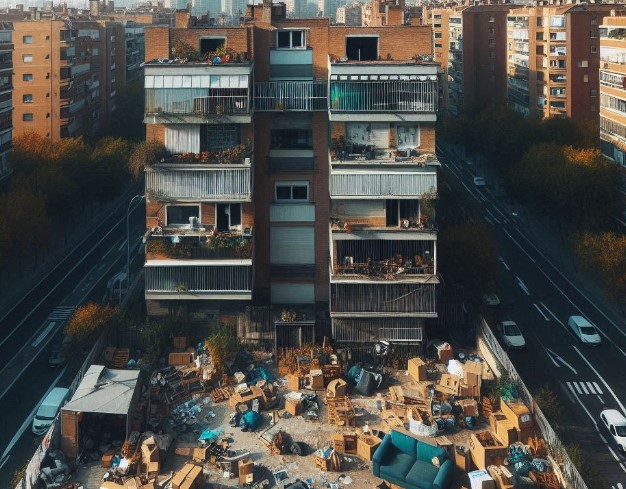Illegal squatting in Spain is not a hoax. This is the conclusion of a recent analysis by the Institute for Economic Studies, led by Íñigo Fernández de Mesa and economist Gregorio Izquierdo. This study, which I had access to, confirms the increase in complaints registered in Spain for this reason, particularly between 2018 and 2024, with an increase of up to 34.5%.
Currently, the latest data records a total of 16,426 complaints, which corresponds to approximately 317 per week. Compared to the previous year, illegal squatting has experienced a 7% increase. This trend highlights the persistence and complexity of the phenomenon in our country, despite statements by the government and many left-wing parties, including Podemos, that deny this situation.
According to statistics, Catalonia is the region of Spain where this phenomenon is most prevalent, with 7,009 complaints. At the national level, this represents 43% of the total, followed by Andalusia with 13%.
Empty Houses
The study of the problem of illegal squatting in Spain also examines the number of vacant properties in each autonomous community. The data shows that Catalonia has the highest incidence, with a squatter rate of 391, almost four times the national average.
The Community of Madrid follows with 180, a figure significantly above the average. Regions such as the Basque Country (148), the Balearic Islands (113), and the Region of Murcia (108) also have a relatively high number of squats relative to their vacant properties.
In contrast, regions such as Galicia (11), Castile and León (20), and the Principality of Asturias (23) have a low incidence of squatting relative to their vacant properties. Illegal squatting is influenced by the varying tensions in the real estate market.
The slowness of justice
Another significant problem is the slowness of justice. Data on possession proceedings for illegal squatting in the various autonomous communities illustrate this. The think tank led by Izquierdo Llanes points to “an alarming situation of slowness and inefficiency in judicial and administrative processes.”
In Spain, possession proceedings for illegal squatting have lengthened from 4.9 months in 2018 to 12 months in 2023. This represents an increase of more than 50% across most regions; average deadlines for judicial interventions have increased in recent years.
One example is Andalusia: Data from the Ministry of the Interior show that the average process in this region was 13.6 months in 2023, a significant increase compared to previous years. In 2018, the waiting time was only 4.9 months. Similar trends can be observed in regions such as Murcia, where the waiting time has risen to 14.7 months, and Castilla-La Mancha, where it is 15.2 months. Even in large regions such as Madrid and Catalonia, the waiting times are not much better, at 11.2 months and 11.8 months respectively in 2023.
Evictions in Catalonia
Regarding evictions due to rent arrears, the IEE report shows a relatively stable trend between 2013 and 2019, with an average of around 36,000 evictions per year during this period. Between 2020 and 2024, this average fell by about a third, due to a number of measures such as temporary aid and moratoria.
Nevertheless, the trend of evictions in Catalonia remains extremely relevant, with an alarming rate of 455 in 2024, almost five times higher than the national average and indicating an excessive concentration of evictions in this region.
Although Catalonia is the autonomous community with the highest number of evictions, Andalusia, the Valencian Community, and the Community of Madrid also have relevant figures, with 248, 223, and 170, respectively. Together, according to the Institute of Economic Studies, “they underscore a serious housing crisis that persists and is not adequately resolved at the regional level.”
80% of Spaniards demand action
The Platform of People Affected by the Occupation supports this report. According to the IEE, they state that the increase in this phenomenon “reflects the government’s legislative inaction in this area.” Ricardo Bravo, spokesperson for this platform, supports these arguments with a clear consequence of inaction: 30% of those affected have decided not to turn to the courts due to their slowness and the fact that the courts turn their backs on them because the interests of the squatters prevail.
Bravo emphasizes that this inaction, “combined with the Royal Decrees against evictions passed during the pandemic, has also led to a form of squatting that those affected are currently suffering, and that is the Inquisition.” The truth, according to the spokesperson, is that the statistics already reflect this great social concern, with 80% of Spaniards in favor of swift measures to evict squatters.
The phenomenon of squatting, Bravo explains, has also triggered another problem affecting the housing market, as “it is affected by serious legal uncertainty,” leading owners to avoid renting their homes for fear of squatting, which reduces supply and increases prices.




